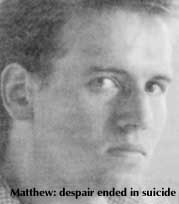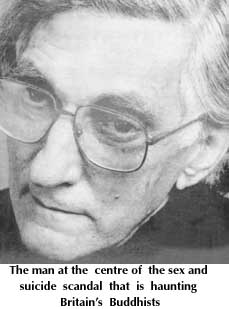

![]()
Matthew, a talented Oxford graduate rejected careerism in the mid-1980s and joined a controversial Buddhist movement. Seven years ago he killed himself. Now the British-based cult is engulfed in allegations that it manipulated vulnerable young men into becoming homosexual
In a small network of streets around the old fire station in Bethnal Green, East London, can be found Britain's last revolutionaries. But these are no socialist workers they are the Friends of the Western Buddhist Order, one of Britain's biggest and fastest growing Buddhist organisations. They believe they are evolving the Higher Individual and the New Society according to the 2,500-year-old principles of the Buddha, as adapted for the late 20th century by their revered leader, Sangharakshita formerly known as Dennis Lingwood. They might be called the last remnants of sixties' hippie idealism.
Some and they include many senior Buddhists watch their success with alarm, and privately accuse them of peddling a quixotic ideology which owes as much to Nietszche and 20th century psycho-therapy as to a highly eclectic pot-pourri of eastern Buddhist traditions.
 Even
more disturbing, the cases of three vulnerable young men have emerged which
detail sexual manipulation and oppressive authoritarian cult behaviour
which, in the case of one man, has been cited as a significant factor leading
to his suicide.
Even
more disturbing, the cases of three vulnerable young men have emerged which
detail sexual manipulation and oppressive authoritarian cult behaviour
which, in the case of one man, has been cited as a significant factor leading
to his suicide.
The nerve centre of this now international religious organisation with bases in Spain, Germany, the US and Australia, as well as in 30 UK locations is an enormous Victorian house on a leafy street in Moseley, Birmingham. There, Subhuti (formerly Alex Kennedy), widely regarded as Sangharakshita's righthand man, admits with exemplary honesty that he has been waiting for a journalist to stumble on this murky past. "Thank God it's not the News of the World," he comments with characteristic mildness.
Nine years ago, one of the flagship FWBO centres spectacularly imploded in a welter of allegations of homosexual abuse, personality destruction and manipulation. It bore all the characteristics of a cult as Subhuti admits, and it left at least 30 people badly damaged psychologically. "People got caught in a collective delusion, a group psychosis which was very interesting but distressing," Subhuti says.
What makes these revelations potentially so damaging to the FWBO is that they implicate its very founder. The 700 Order members and 1,400 mitras (novices) perceive Sangharakshita as a man of great spiritual insight and compassion. But Mark Dunlop tells another story. In 1972, as a 22-year-old curious about Buddhism, he started a FWBO meditation class. Singled out by Sangharakshita, he became his virtually constant companion for years.
"I was very in awe of Sangharakshita," he says. "He represented Buddhist ideals. But he was petulant and controlling. He doesn't boss people about but suggests something isn't spiritually appropriate. I thought he was an important spiritual teacher and I ought to do whatever I could to help him."
Sangarakshita persuaded Mark that in order to develop spiritually he had to get over his antihomosexual conditioning, which was blocking him from devoting his energies to the spiritual life. He offered to help Mark.
"He would want to have sexual contact about twice a week on average. He usually said something like, 'Let me just lie beside you for a while'. I dreaded hearing this but felt mean and selfish if I thought of refusing. It was distressing, but some of the other Buddhist practices I had recently learned were themselves strange, such as meditation, but there were apparent benefits.
"He would get into my bed and perhaps stroke my chest for a while. Then he would get on top of me and rub himself against my stomach until he had an orgasm. I found the whole business repellent but at least it didn't take very long only about four or five minutes usually. I was completely passive throughout, just waiting for him to finish.
"I felt on balance I had to take his ideas on anti-homosexual conditioning seriously. If I protested he would admonish me that I should not give into conditioning and allow it to inhibit the development of our 'spiritual friendship'. Giving up the homosexual relationship would be like giving-up Buddhism and the spiritual journey. I kept thinking I would have a breakthrough and would get aroused. I was very embarrassed by the sexual relationship and I saw this as my not being able to accept myself as I was bisexual. I felt it was my duty to Buddhism and Sangarakshita as the person who was bringing Buddhism to the West.
Eventually, Mark summoned the courage to bring an end to the sexual relationship, and his friendship with Sangharakshita for whom he had bought a house with an inheritance then petered out. But Mark remained in the FWBO until 1985, struggling to hold on to Buddhism.
When he finally left he felt a great sense of failure and guilt about being heterosexual. He blamed himself and became severely depressed.
Sangharakshita, who officially retired last year, although he continues
to be the FWBO's guiding influence, refuses to comment on Dunlop's allegations,
which were first made a decade ago. But he has admitted several times that,
after his return from India to England in 1967, he broke his monastic vow
of celibacy and "experimented with sex" "I was just exploring
certain things for my own benefit, for the satisfaction of my own curiosity."
By the early eighties, one of Sangharakshita's followers was heading a centre which was strikingly successful in attracting new recruits. One of these was Tim (he does not wish to give his surname), who was trying to throw off drug addiction. Meditation classes became a full-time commitment and, aged 19, he moved into the single-sex community of 27 men. He worked an average of 45 hours a week in the co-operative business for £22 a week.
"I gave up drugs overnight. I was torturing myself ashamed of having been in drugs. It was like my detox. In the midst of that process of getting well and growing up, I was exposed to the spiritual orientation of the place. The head of the community was a very powerful, intrusive personality and incredibly manipulative. He would intuitively become aware of people's vulnerabilities. The one thing you are when you are withdrawing from drugs is very vulnerable. I must have had that printed all over me.
"He would massage my ego. Suddenly I was no longer a normal kid coming off drugs, I was on the point of enlightenment. He put me on a pedestal. I fell for it. They asked to me keep away from women and relationships because they are totally neurotic.
"Then he used to say, 'Can't you feel what's going on between us?' I just didn't know yes, no, I don't know. I was so done in and the meaning of life had become bound up with my homosexuality and its repression. Gradually he became more and more clear about my homosexuality being directed towards him. He could solve this for me, he used to say. In the end he took me to bed. It happened twice. It couldn't have been much fun for him, it so obviously wasn't where I was at."
Like Mark, Tim blamed himself and remained in the FWBO unhappy and confused. He only finally left six months ago.
The tightly controlled manipulative environment at this centre which Tim describes also played a major role in the suicide of Matthew (his family does not wish the surname to be used) in 1990. Like Mark and Tim, Matthew started FWBO meditation classes at a vulnerable point in his life. Highly intelligent, he had won a scholarship to Oxford to read law but after coming down had grown increasingly disenchanted with careerism and materialism. He suffered from depression and was attracted to meditation to cope with his emotional problems.
When he emerged, he was "withdrawn and bleak", according to his mother, Denise. He was unable to hold down a job or start a relationship and was referred to a psychiatrist to be treated for depression. Three years later, he committed suicide.
Some of his diary entries while he was with the FWBO capture his confusion and anguish.
January 1985: I feel more trapped here. Trapped by the . . . routine, trapped by the ominous determination of "spiritual friends" to keep me here. I'm losing my will. Panic! I seem to have stumbled in desperate need of shelter into the Tiger's Cave.
February: I feel sometimes that openness to the Order means giving up one's mind, thus becoming merely an adjunct of the Order. Still could be great!
Matthew was seen for two years by a clinical psychologist, who was in no doubt of the detrimental impact the FWBO had on him. He concluded in his report: "Matthew's problems as to a large part resulted from the traumatic effects of his experiences whilst he had been a member of the FWBO . . . talked about them with great bitterness. He told me he had decided shortly after entering the FWBO community that he was unsuited to stay there; however he felt trapped and unable to leave as he had fallen under the influence of his tutor, a man he later came to see as being an exceptionally skillful manipulator of other people."
Sangharakshita's and Subhuti's published writings reveal an extraordinary agenda on sex, family and women. A misogynistic biological determinism consigns women to a "Lower Evolution", where their hormonal rhythms and desire for children render them spiritually inferior to men. The biological drive apparently makes women manipulative as they seek to "ensnare" men into providing for them and their offspring. Women as mothers and partners suffocate the development of men's true identity. The heterosexual couple is scorned as "mutually addictive and neurotic" and the family is the "enemy of the spiritual community". Rearing children is dismissed by Sangharakshita in a memorable analogy as being as spiritually significant as a rainy day.
While the FWBO's Buddhism may be awry, and some of the fruits of that have been disastrous, there are many sincere Buddhists within the Order who will be profoundly disturbed by this article. The FWBO argues in effect that the day to day activities and friendships within it have little to do with some of the ideas of Sangharakshita and Subhuti. It seems that where the FWBO becomes dangerous is when people begin to apply such teaching literally. Some have done so in the past with devastating consequences. Could they again?
The Guardian
Continue to Plus page 10 * People and Events
Return to the Plus contents page
![]()
| HOME PAGE | FRONT PAGE | EDITORIAL/OPINION | NEWS / COMMENT | BUSINESS
Please send your comments and suggestions on this web site to
info@suntimes.is.lk or to
webmaster@infolabs.is.lk